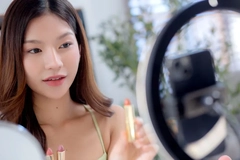Clean up and green up: Eco-friendly personal care and beauty solutions “leaping off the lab bench”

08 May 2023 --- Designing sustainable skin and hair care solutions in line with the conscious beauty movement is a delicate balancing act of naturality, traceability and functionality expectations. This year’s host of eco-friendly ingredient launches include plant-based eco-stylers, upcycled wood chips from rosewood essential oil supply chain and a face-sculpting solution produced through a combination of ancient Asian wellness practices and artificial intelligence (AI).
PersonalCareInsights takes a look at the latest eco-friendly developments at industry suppliers Ashland and Eurofins.
Bio-based solution breakthroughs
Ashland introduced eight “breakthrough” innovations with green credentials for the personal care industry at the recently concluded In-Cosmetics Global trade show in Barcelona, Spain, which featured in live reporting by PersonalCareInsights in March.

“Our new products are designed to leap off the lab bench and into the field delivering sustainable solutions to fuel customers’ growth and delight consumers all over the world,” says Xiaolan Wang, senior VP and general manager of personal care at Ashland.
 Liftyl Biofunctional by Ashland is a retinol-alternative ingredient made from upcycling wood chips, a byproduct from the rosewood essential oil distillation process in premium fragrances.Over the course of a month, Ashland’s website took viewers on a new product journey from original product sketches to mannequins in Ashland’s booth at the show, outfitted with the natural ingredients used in the new products.
Liftyl Biofunctional by Ashland is a retinol-alternative ingredient made from upcycling wood chips, a byproduct from the rosewood essential oil distillation process in premium fragrances.Over the course of a month, Ashland’s website took viewers on a new product journey from original product sketches to mannequins in Ashland’s booth at the show, outfitted with the natural ingredients used in the new products.
The mannequins were dramatically “brought to life” for customers during a live, immersive event on the tradeshow floor where professional models wore apparel donned in crocuses, coconuts, rosewood, raspberries and more.
Upcycled rosewood and saffron beauty ingredients
Ashland’s latest innovations include Phyteq Raspberry One Multifunctional, an all-in-one, liquid multifunctional blend to enable easy formulation. Designed for difficult-to-protect leave-on formulations like sunscreens and pigmented emulsions, this multifunctional provides skin benefits like antioxidant and well-aging properties, with readily biodegradable ingredients and wide pH applicability.
Liftyl Biofunctional is another Ashland launch, made from upcycling wood chips that are byproducts from the rosewood essential oil distillation process used in premium fragrances. It is inspired by ancient wellness practices in Asia and is driven by AI. Liftyl Biofunctional is based on the latest ethno-genomic research in facial sculpting and is marketed as an alternative to retinol with similar efficacy, for sensitive skin.
The rosewood extract is sustainably sourced in Peru with full traceability, transparency and CITES-required documentation – based on a multilateral treaty to protect endangered plants and animals from the threats of international trade – for preserving this rare and noble wood. It is obtained using supercritical carbon dioxide extraction, dubbed a “premium technology.”
“Consumer benefits include a lifted V-shape line, redefined contours, bouncy skin, fuller cheekbones, softer wrinkles and improved facial harmony,” details the company.
Next in Ashland’s new range is Saffragyl biofunctional, a “breakthrough” oral hygiene innovation in daily gum care that uses 100% natural and biodegradable upcycled saffron flower byproduct from the spice handcraft.
“It is sustainably sourced in France, with full traceability and transparency over the supply chain including responsible farming practices and a sustainable extraction process,” notes the supplier.
Next up, Sensiva Go is Ashland’s natural antimicrobial blend with strong, broad-spectrum efficacy and multifunctional properties suitable for sensitive skin. This moisturizing multifunctional is COSMOS validated, 100% natural origin, readily biodegradable and has wide pH applicability.
 Biodegradability is an essential factor to consider when assessing the environmental impact of raw materials and finished beauty products.Lastly, Puraloe is Ashland’s aloe vera ingredient that is certified responsible, organic, kosher and halal. Puraloe aloe vera joins the company’s ongoing sustainable guar initiatives under the Ashland Responsible Solvers program.
Biodegradability is an essential factor to consider when assessing the environmental impact of raw materials and finished beauty products.Lastly, Puraloe is Ashland’s aloe vera ingredient that is certified responsible, organic, kosher and halal. Puraloe aloe vera joins the company’s ongoing sustainable guar initiatives under the Ashland Responsible Solvers program.
Calling time on “forever chemicals”
Countries are increasingly ramping up efforts to eliminate per- and polyfluorinated substances (PFAS) – also known as “forever chemicals” – from cosmetic and packaging products. Remediation technologies, such as those being scaled by Evonik and Intrapore, are being developed to remove the presence of these resistant toxins in soil and groundwater.
“PFAS methodologies and regulations are continually evolving as additional compounds are identified, and local regulations continue to expand their testing requirements for these contaminants,” says Sarah Bachir-Levy, cosmetics and personal care international marketing manager at Eurofins.
“With our dedicated teams, Eurofins network of laboratories is able to offer the flexibility to develop a testing plan and adapt to the continually changing analytical needs,” she notes.
“With more than 20 years of experience, we are able to test a wide range of matrices for up to 75 PFAS compounds, with a breadth of equipment dedicated to PFAS analysis and LOQ/LOD capabilities.”
Bachir-Levy also notes that Eurofins was an early responder to concerns over microplastics, another ubiquitous micropollutant. The company has developed. quantitative methods to determine the presence of microplastics, identify and qualify polymers and determine the plastic composition of packaging.
“To ensure your cosmetic products comply with regulatory obligations, Eurofins companies offer dedicated tests to characterize and analyze nanoparticles, including titanium dioxide and zinc oxide,” she adds.
Eurofins’ specialized laboratory in France is the first European laboratory accredited in accordance with the NF EN ISO/IEC 17025 standard on the characterisation of the morphology and distribution size for nanoparticles in raw materials used in cosmetics and finished cosmetics products using Transmission Electron Microscopy technology.
Assessing biodegradability
Biodegradability is the capacity of a material to decompose over time as a result of biological activity, especially to be broken down by microorganisms, into smaller molecules, such as carbon dioxide, water and mineral salts.
OECD 301: Ready Biodegradability Guidelines are standards that are the most used today to measure a substance biodegradation, which is important in assessing the environmental impact of raw materials and finished beauty products. The standard for the assay is chosen according to the properties of the test substance, such as solubility and volatility.
“Biodegradability tests on finished products and raw materials are really important issues for the cosmetics market,” comments Bachir-Levy. “Indeed, biodegradability is a criteria in regulations such as the EU’s Registration, Evaluation, Authorisation and Restriction of Chemicals regulations for awarded labels such as the European Ecolabel, for example.”
 Animal welfare remains in the spotlight as a key purchasing driver for beauty and personal care products.Ecotoxicity is another measure of the impact of substances on living organisms, in various ecosystems: fresh water, sea water and terrestrial media. Eurofins also assists customers with studying the acute toxicity or the chronic toxicity of a product ingredient.
Animal welfare remains in the spotlight as a key purchasing driver for beauty and personal care products.Ecotoxicity is another measure of the impact of substances on living organisms, in various ecosystems: fresh water, sea water and terrestrial media. Eurofins also assists customers with studying the acute toxicity or the chronic toxicity of a product ingredient.
“Like biodegradability, ecotoxicity is a criteria in regulating labels, according to OECD or ISO guidelines,” says Bachir-Levy.
Vegan verification
Animal-free claims are gaining ground as conscious consumption maintains hold on purchase decisions. Particularly in Asia-Pacific, several factors – from a rise in domestic income and an ingrained fear of climate change – have pushed up purchasing power for plant-based beauty and personal care products.
In partnership with the Vegan Society, Eurofins recently developed a Vegan Verification Programme to assist its customers to determine if any animal-based compounds are present in their products.
“This innovative methodology provides a complete solution for cosmetics and personal care products, which establishes whether any animal products or byproducts have been used in their manufacturing and development process,” says Bachir-Levy.
Vegan Verification helps to specify vegan cosmetics products using a “phased approach covering toxicological and regulatory assessment, DNA testing, on-site auditing and declarations of conformity or labeling,” she details.
Upon successful completion of testing, clients can qualify for use of the Eurofins Vegan Verified logo on their products and/or promotional material.
“In addition, clients are able to apply for use of the Vegan Society Trademark. This complete program allows manufacturers, brands and retailers to properly test their products and label them as 100% vegan.
In recent animal-free launches, Ashland released its Antaron Soja glyceride, a nature-derived, biodegradable, non-microplastic film former that provides water resistance, SPF boosting, long-wear and color transfer resistance. This vegan, non-GMO, non-greasy film former can be used to make more natural, better performing sun care and color cosmetic formulations, including creams, lotions, gels, sprays and lip sticks.
Styleze Es-dura is another Ashland ingredient launch, serving as a plant-based ecostyler for all-weather style durability and curl definition. It delivers a lightweight feel and natural movement for hair. It is nature-derived, biodegradable, non-GMO and uses guar-based polysaccharide technology.
Meanwhile, the company’s Softhance Mr is a conditioning agent that harnesses the power of soy and glycerin to provide moisture retention and deliver a soft, moisturized feel to skin in body wash, facial and hand soaps, cleansers and scrubs.
This nature-derived, biodegradable, non-GMO and vegan-suitable conditioning agent has an excellent deposition profile and imparts “consumer-perceivable skin softness.” Compatible with anionic and non-ionic surfactants, this new product enables clear or opaque formulations.
By Benjamin Ferrer













